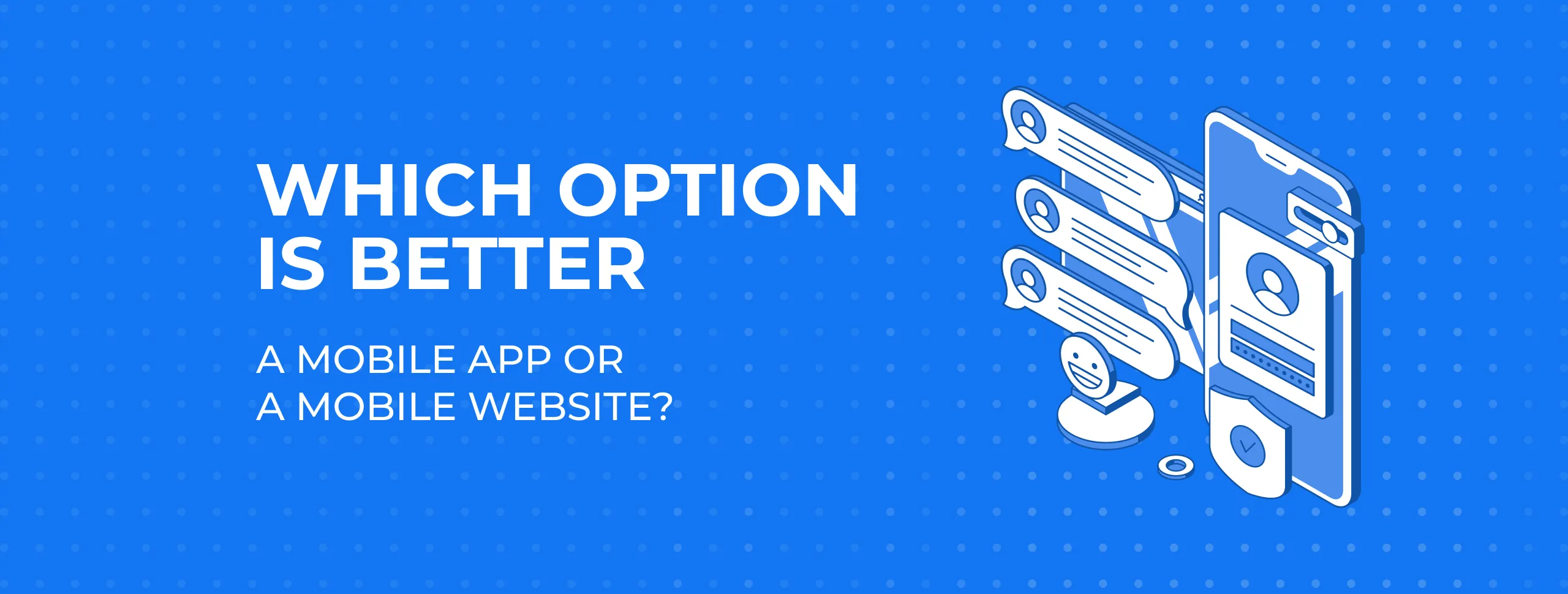
Which Option is Better, a Mobile App or a Mobile Website?

Definitions
There are currently two different ways to technically develop and implement projects for mobile devices: a mobile website and a mobile application.
A mobile website is a specialized site which adapts to viewing on mobile devices. Such website can include interactive components using JavaScript, HTML5 and new browser API. This type of adaptive design is also called a web extension. From this point onwards, to avoid any confusion, any adaptive design, which works within a browser of a mobile device will be called a website.
A mobile app is a specially developed application, which fits a designated platform, be it iOS, Android or Windows Phone. Typically such app is developed in a high-level program language and is compiled into a native code of the Operating System, which allows for maximum efficiency.
There is also a third option - a mobile app which includes browser components. In this case a part of a mobile app is often used for navigation and integration with OS, and a web component - to show content. Typical users often can’t distinguish a difference between this version and a native mobile app.
More details:
Interface
One of the top arguments, which is often used by mobile application designers is the proximity to OS and a familiar user interface. A mobile app is, in fact, most closely integrated with a platform and allows the actualization of a responsive interface. On the other hand, a website can also provide a very convenient and user friendly method of interaction. At this point website rendering is way behind the mobile app, but the power of mobile devices is continuing to grow and the browsers themselves are also experiencing positive shifts in the right direction. On top of this, different versions of mobile OS can dictate their own standards, which you have to comply with and some of these new standards can be difficult to comprehend by regular users. It is important to outline that the most active users (the ones who rate things and leave comments in app stores) are those, who are big fans of latest innovations in mobile OS. You should make a note of this when you are promoting a project as those can be your allies, who can spread the the word about your newest app.
High speed performance
An interactive website is never as fast as a mobile app when it comes to high speed performance. Browsers on mobile devices are far from being highly efficient. On top of this, web developers use outdated versions of libraries. Wrong implementation of these libraries doesn’t affect “big” browsers, which is why most people just put up with this. On the other hand, a mobile app can also sometimes be lacking in high speed performance - too much animation and a complicated interface dramatically decrease the number of clicks. Moreover, to create advanced graphics and animations, developers have to use low-level programming languages and special libraries and frameworks.
Integration with a platform
Mobile apps are way ahead of websites when it comes to working with a specific platform. Mobile apps are built for integration with a specific platform. If a component of a browser is embedded in the app then the difference gets leveled out. Moreover, the level of access to device capabilities keeps growing constantly through an expanding set of API.
Internet availability
A website is launched from a browser and needs a steady internet connection to work properly. It doesn’t matter whether the project exists solely online, but even if it does, the lack of internet connection, can cause unpleasant delays for a user, especially when it comes to navigation between two parts of an app. Using API to store local data could probably fix this issue, but so far no examples of such use could be found. On the other hand, mobile apps can work without internet connection or with limited connection, performing caching and data refreshing, when the connection becomes available again. That said, the vast majority of mobile apps on the market today still require a steady internet connection to be used.
Fragmentation
When it comes to mobile apps, if you are planning on covering several platforms (iOS and Android for example), you will need to develop an app for each one of them separately. Each one requires its own environment and language and has interface standards that you need to comply with. For a mobile website, one version needs to adapt to all browsers and platforms. In theory it should, but in reality all browsers function differently on different platforms. This means that you will either need to support several versions of the same website or adjust the code in a way that the content would change based on the current request. Significant differences in screen sizes also impact what and how an end user sees your website.
Resources
There are many rumors around mobile app and web developers. People tend to think that it is extremely difficult to find a mobile app developer and that they all require a large salary, not to mention that you will most likely need a separate mobile app developer for each platform. At the same time, everyone assumes that there are many web developers out there and that their services are much cheaper. Apparently, it all depends on the situation. If you already have a web developer, then the most profitable decision for you would be to create a mobile website. If you have a mobile app developer, then the development of a mobile app might not cost you as much as you think. Then again, it all depends on the project - if they will need to access the server side, and most likely they will, then you will definitely need a web developer.
Publication
Apps on several platforms are “tied” to a specific store (Windows Store or App Store). Even if a strict tie doesn’t exist, most people are still accustomed to looking for apps in stores, such as Google Play, or App Store. These stores impose serious restriction on the functionality of the apps, especially when it comes to paid services. On top of that, you will have to spend a significant amount of time on getting each new version of an app approved. A mobile website, on the other hand, will be available right away. All you have to do is open up your browser and enter the address. Upon a closer look, however, it might also turn out to be a very time consuming endeavour. A new version of a website is available as soon as it is published. Your ability to provide paid services is not restricted in any way. However, there are always two sides to a coin. On one hand, when it comes to mobile apps, there are platform-based restrictions and slow publication times in app stores, but on the other hand, the store already has a large number of users and a system for providing paid services in place. For a mobile website you will need to both attract users yourself and create a payment system through a website, which will be available from a mobile device and these two processes might end up being both difficult and time consuming.
HTML5
Lately, there is a lot of buzz around HTML5. It is interesting to take a look at it from a marketing and a technical point of view.
Technically speaking, HTML5 is a further enhancement of an HTML markup language. However, a big step was made towards structuring the presentation, rather than the display format. This programming language encompases a lot of multimedia capabilities, including playing audio and video. There is also a capacity to work with graphics. The CSS formatting tables also expanded dramatically. Several API capabilities were added to JavaScript to improve the work with graphics, local data and multimedia content. The language itself has improved significantly, especially when it comes to high speed performance. Standard HTML5 continues to get more features and improvements.
From the marketing point of view, HTML5 is a much broader concept. It encompasses many additional API, which are supported by pretty much all browsers and many CSS extensions, primarily in the field of interactive mapping. A high level of interactiveness of a website makes it almost impossible for users to distinguish it from a native app.
From the perspective of a mobile app development HTML5 is a valuable point. At present interactiveness of a website is a must, no matter if it is achieved through JavaScript or API. Therefore, a web developer must possess the necessary skills and knowledge of HTML5 to be able to apply them when needed.
Conclusion
It seems that there is no obvious and straightforward solution. Both mobile apps and mobile websites have their pros and cons. A combined solution also solve some problems, but brings in the new ones. Therefore, it is safe to say that each case requires an individual approach.
If you are looking to save the resources, the best option seems to be web development. The main challenge is not to get pulled down by the intricacies of implementation and to provide users with the most useful functions. Remember that content is king and you should focus on it first. “Prettification” WITH animation and graphics are nice to have, but they are definitely not as important.
If you are planning on interacting with your end users online, you should definitely start with a website which can reach both mobile device users and regular desktop and laptop users. When you have this ready, you can also think about developing mobile apps for selected platforms to broaden your reach. This is the best option for a the majority of businesses.
When it comes to developing games and other apps that require a high level of interface performance, a mobile app is the best option. There are also cross-platform libraries for game development that allow one code to be used in native apps for different platforms with minimal adjustments.
If the project you are working on encompasses a lot of offline work and is geared towards mobile users, then you should be in favor of mobile app, but keep in mind that you might still need a web developer.
So, it’s really, the answer to your question of estimation mobile app or mobile website advantages lays in the deep investigation of your wishes, goals and expectations. Do not hesitate to contact us and ask.





